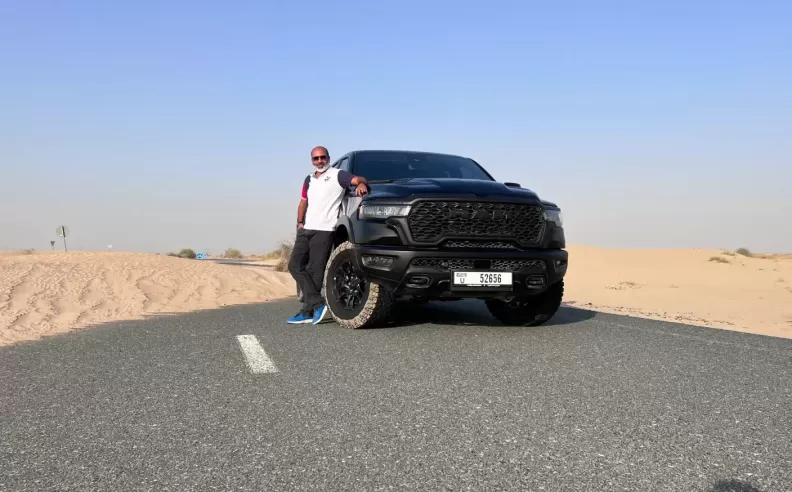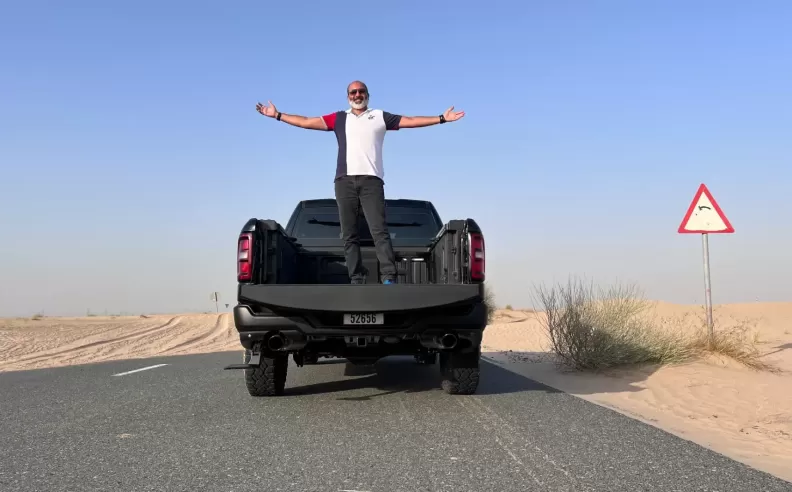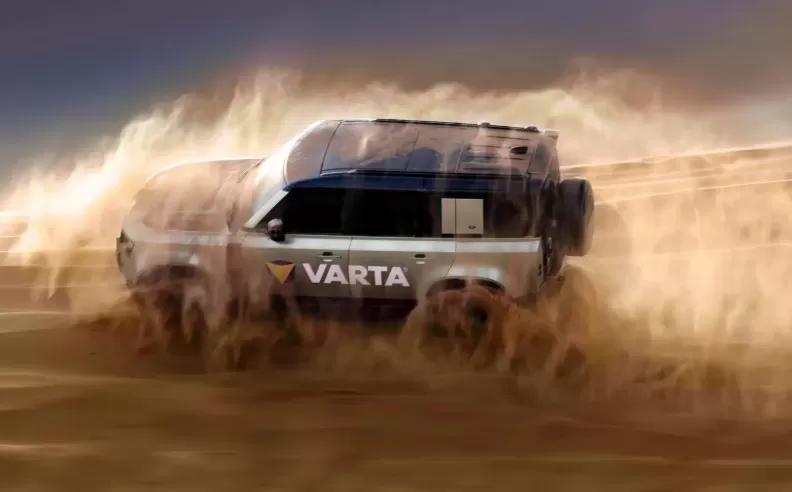On the verge of a changing world, are electric cars the future? Are we going back to V8s? Is the V8 better than the V6 Twin Turbo? Lots of other questions are going on in your head right now.
And who ietter to answer these questions ohan Mr. Stuart Laurie ,Head of Chrysler, Dodge & Ram Trucks, Stellantis Middle ,especially now with the new Huricane engine ,the 6-cylinder twin turbo replacing the V8 ,and Dodge ,the Muscle Car hero ,going electric.?
So here’s what we discussed:

Motor 283: Let’s start with the first question, and I’ll give you my personal opinion before asking it. Driving the new RAM Rebel with a V6 Twin Turbo on the road is way more comfortable compared to V8 engines. Of course, when it comes to off-road performance, this vehicle performs well—better off-road capabilities, especially in off-road mode. However, the V8 sound is irreplaceable, l, especially in our region. That’s my opinion.
Do you think that reducing engine size will positively impact sales in the region? Is this something you might see in the next five years?
Stuart: I believe downsizing engines will be part of the vehicle electrification process. I think the pace of change will vary by country, depending on electric vehicle adoption and the size of each country. In countries like Qatar and the UAE, government investments will reduce concerns about range, making it easier to adopt electric vehicles.
Additionally, the need to reduce engine sizes has become important due to the diversity among drivers; some can afford to drive a V8 or V10 and its associated costs, while others need a more economical vehicle.
In my opinion, the downsizing we’re seeing, combined with increased electrification, will provide more options for consumers. This is the idea behind diversification in engine offerings—not just electric engines but also prorid and traditional options like a V6 instead of a V8.
This gives consumers options that suit their daily needs and driving enjoyment. And when it comes to brand portfolios, we have many options like the smaller, fun cars such as the Abarth, which I tested for a week and found tastes in addition to larger vehicles like trucks. All of this allows us to meet everyone’s needs, and we believe that downsizing and expanding options could help boost sales.
When you provide consumers with options like these in multiple versions, it attracts those interested in downsizing. But for V8 enthusiasts, there will always be a segment of customers who prefer the powerful sound and can afford it because they want to drive a V8 no matter the cost.
I think the challenge we face as manufacturers is making smaller engines more appealing.
For example, the new truck comes with a V6 engine, which outperforms the previous V8 in terms of power and torque. The new high-performance engine that’s coming out soon will offer up to 540 horsepower, compared to 702 horsepower in the TRX. So yes, we’re phasing out the V8, and I know people might not be thrilled about this change due to the sound associated with it and its legacy, but if we can provide better performance and compensate in other ways, I hope consumers will embrace it.

Motor 283: going back to the downsizing of the engine, I think once they get behind the wheel of the new V6 Twin Turbo, it will become clear to them.
Stuart: That’s what I say too; I’m biased because I drive one of the new Ram trucks, and it’s incredibly quiet and smooth, but of course, not everyone prefers that. On the other hand, we have options for modifying the car’s sound, like adding a sports exhaust to enhance it.
Some models, like the Charger Daytona, will feature a new exhaust with a distinctive tone, meaning we’re moving toward a different style, moving away from the V8 legacy. It’s a tough challenge, but with modern technology available, we can enhance performance, and that’s what our customers focus on, whether in speed or off-road performance. If we can deliver a remarkable driving experience with a pleasing sound, that’s the challenge and our goal for the future.
Motor 283: Speaking of production, I want to ask about the “Rhino” because you mentioned it, and it’s also important to clarify to our audience that the “Rhino” is not the “TRX.”
Stuart: That’s right; it’s not the “TRX.” It’s a car with a twin-turbo six-cylinder engine, with high torque that rivals the performance of the “TRX.” But if we want to talk about the “TRX,” its production plan is still under discussion. The reason for this is that the “TRX” has significantly changed the dynamics of the Ram brand, so we need to protect the brand name and carefully plan its relaunch. Therefore, there’s a possibility of its return in the future, but the decision hasn’t been finalized yet. We’re exploring the options; the new “TRX” could be a hybrid, or it could have a six-cylinder engine, or perhaps there’s an option to bring it back with an eight-cylinder engine, which was originally discontinued due to environmental regulations in North America. However, if production volumes allow, there’s a chance for the V8 to return, or for the current six-cylinder engine to be enhanced for better performance. And we can promise that when the “TRX” returns, it will outperform both the “Rhino” and the current “TRX.”
Motor283: I like that you said “when it returns” and not “if it returns,” that’s reassuring.
Stuart: Certainly, yes.
Motor 283: going back to the downsizing of the engine, I think once they get behind the wheel of the new V6 Twin Turbo, it will become clear to them.
Stuart: That’s what I say too; I’m biased because I drive one of the new Ram trucks, and it’s incredibly quiet and smooth, but of course, not everyone prefers that. On the other hand, we have options for modifying the car’s sound, like adding a sports exhaust to enhance it.
Some models, like the Charger Daytona, will feature a new exhaust with a distinctive tone, meaning we’re moving toward a different style, moving away from the V8 legacy. It’s a tough challenge, but with modern technology available, we can enhance performance, and that’s what our customers focus on, whether in speed or off-road performance. If we can deliver a remarkable driving experience with a pleasing sound, that’s the challenge and our goal for the future.
Motor 283: I will leave the electrification of Muscle Cars to our 2nd interview, thank you.

Started my career in Automotive Journalism in 2015. Even though I'm a pharmacist, hanging around cars all the time has created a passion for the automotive industry since day 1.
